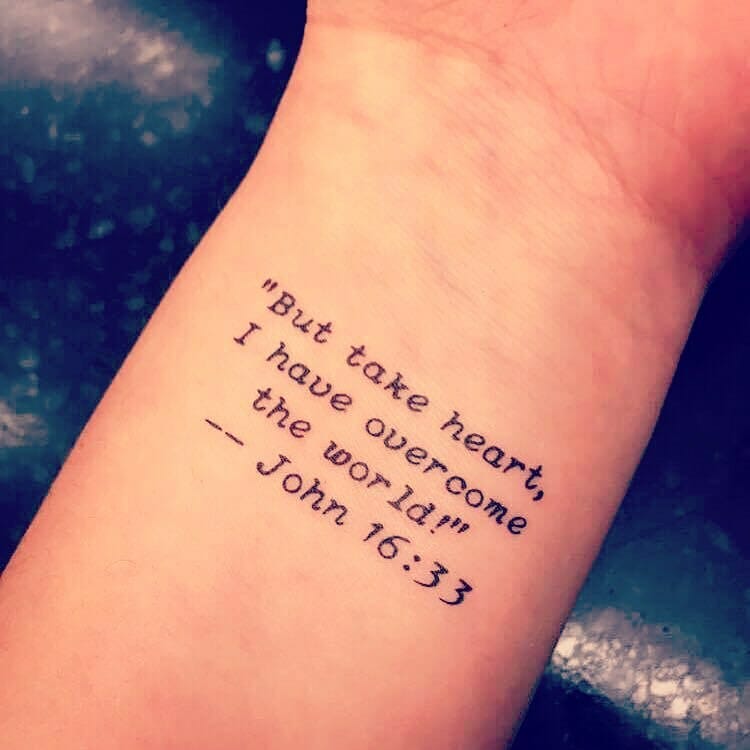Is getting a tattoo a sin? For many Christians navigating the modern world, the question of whether adorning their bodies with ink aligns with their faith is a complex one.
The increasing popularity of tattoos and body modifications has led to a surge in curiosity among Christians about the Bible's stance on the matter. While Leviticus contains a specific verse addressing markings on the skin, the larger discussion about body art includes our motivations, intentions, and how we honor God through our choices. This article explores biblical perspectives on tattoos, examining both Old and New Testament passages to offer a comprehensive understanding.
| Topic | Description |
|---|---|
| Key Verse | Leviticus 19:28 - "You shall not make any cuttings in your flesh for the dead, nor tattoo any marks on you: I am the Lord." |
| Old Testament Context | Prohibitions against pagan practices, particularly mourning rites involving body markings. |
| New Testament Perspective | Focus on inner transformation, intentions, and honoring God with one's body. |
| Christian Denominations | Varying stances, influenced by personal beliefs, cultural context, and interpretations of scripture. |
| Modern Interpretations | Some believe the Leviticus verse does not apply to modern tattoos, which often serve as expressions of individuality. |
| Motivations for Tattoos | Personal identity, beliefs, experiences, remembrance, artistic expression. |
| Relevant Themes | Holiness, obedience, freedom in Christ, honoring God with the body. |
| Additional Resources | OpenBible.info - Tattoos |
Our exploration begins in the Old Testament, where numerous laws and customs were established, forming a framework for understanding our bodies in relation to holiness and society. Leviticus 19:28 is among the most frequently cited verses in discussions about tattoos within the Bible. Its context involves prohibitions against pagan rituals, commonly practiced by other cultures during mourning rites. God instructs the Israelites to avoid these pagan customs, including body markings.
In this article, we will delve into verses from both the Old and New Testaments to provide insight into tattoos, body modifications, and their interpretation by Christians. As tattoos have become increasingly prevalent, debates about their acceptability from a biblical perspective have intensified. We will journey through the scriptures to explore verses touching on the topic of tattoos, unraveling their meanings and shedding light on the principles underlying this practice.
Tattoos have become expressions of personal identity, beliefs, and experiences. However, the Bible contains verses addressing body modification and adornment. Let's examine scriptures offering guidance on the biblical perspective on tattoos, prompting reflection on the significance of body art within a spiritual context. The Bible provides considerable insight into honoring God with our appearances and actions.
We will explore key Bible verses to understand the topic of tattoos, gaining insight into approaching this art form while upholding our beliefs. As we consider tattoos within Christianity, it is crucial to examine the Bible's perspective on this cultural trend. Many Christians question whether getting inked is a sin or acceptable within their faith.
"For whatever does not proceed from faith is sin," Romans 14:23 states. This verse underscores the principle that our actions should stem from conviction and faith. If a Christian chooses to get a tattoo or piercing, it should be done prayerfully, ensuring it honors God. Are tattoos mentioned in the Bible? Yes, Leviticus 19:28 advises against body markings. However, interpretations vary, with some believing this does not apply to modern tattoos that often express individuality.
The Christian perspective on tattoos varies. Different denominations hold different views, and individual Christians may have distinct convictions based on personal beliefs and cultural context. The Bible mentions tattoos in Leviticus 19:28: "Do not cut your bodies for the dead or put tattoo marks on yourselves. I am the Lord." However, understanding the verse's historical context and cultural significance is crucial. God spoke to Moses, saying, "Speak to all the congregation of the people of Israel and say to them, You shall be holy, for I the Lord your God am holy."
Many beautiful Bible verses can inspire impactful tattoos. The Bible addresses tattoos and piercings in a few passages. Leviticus 19:28 states, "You shall not make any cuts on your body for the dead or tattoo yourselves." Explore the biblical perspective on tattoos in our comprehensive article, uncovering spiritual insights. Love is patient and kind; love does not envy or boast; it is not arrogant or rude. It does not insist on its own way; it is not irritable or resentful; it does not rejoice at wrongdoing, but rejoices with the truth. Love bears all things, believes all things, hopes all things, endures all things.
A favorite Bible verse can be a lovely expression to share with the world. Consider inspirational Bible verse tattoo ideas carefully, as getting a tattoo of a scripture verse is a significant decision. Avoid getting inked as an act of rebellion.
The Old Testament provides teachings that offer insights into tattoos. Some might refer to Leviticus 19:28, a verse directly addressing markings on the skin. However, some ponder what the Bible says about this art form. The King James Version (KJV) of the Bible is a trusted source for many Christians, helping them understand God's view of tattoos. We will examine specific verses mentioning tattoos or body markings in the Bible.
The Bibles stance on tattoos is not always straightforward. While there is no explicit "thou shalt not tattoo" command in the New Testament, the Old Testament, specifically Leviticus 19:28, states: "You shall not make any cuttings in your flesh for the dead, nor tattoo any marks on you." To truly understand the nuanced perspectives on Bible verse tattoos, it's essential to delve deeper into the historical, cultural, and theological contexts surrounding these ancient texts and their relevance to contemporary Christian life.
The Old Testament Perspective: Holiness and Separation
Leviticus 19:28 is undeniably the cornerstone of the debate. To fully appreciate its implications, one must consider the broader context of Levitical law. The book of Leviticus is primarily concerned with the holiness of the Israelites and their separation from the surrounding pagan nations. These laws covered various aspects of life, including diet, hygiene, sacrificial practices, and social interactions. The overarching purpose was to establish Israel as a people set apart, dedicated to the worship of Yahweh, the one true God. The prohibitions against specific practices, including cutting the flesh for the dead and tattooing, were aimed at preventing the Israelites from adopting the customs and beliefs of their neighbors.
The practice of cutting the flesh and tattooing was often associated with mourning rituals and the worship of deities. In many ancient cultures, these practices were performed to honor the dead, appease the gods, or demonstrate devotion. God, through the laws given to Moses, sought to eradicate these pagan practices from the Israelite community. This separation was vital to maintaining their identity as a monotheistic nation, distinct from the polytheistic cultures around them. Its important to recognize that these prohibitions were not arbitrary; they were part of a comprehensive system designed to safeguard the spiritual and moral integrity of the nation.
However, the Old Testament is not monolithic. While Leviticus provides a clear prohibition, other passages offer a different lens through which to view the human body and its adornment. The Song of Solomon, for example, celebrates the beauty of the human form, using vivid imagery and sensuous language to describe the physical attributes of the lovers. This book suggests a positive appreciation for the body, even within the context of sacred literature. Furthermore, the elaborate garments and jewelry worn by priests and royalty, as described in Exodus and other books, indicate that adornment was not inherently sinful or forbidden. The key distinction lies in the intent and context of the adornment.
The New Testament Lens: Grace, Freedom, and Transformation
The New Testament introduces a paradigm shift in understanding the law and its application. Jesus Christ, through his life, death, and resurrection, fulfilled the law and inaugurated a new covenant based on grace and faith. The emphasis shifts from external adherence to rules to internal transformation and a relationship with God through Christ. The Apostle Paul, in his letters, repeatedly emphasizes the freedom that Christians have from the law. He argues that salvation is not earned through works of the law but received as a free gift through faith in Jesus. This freedom extends to various aspects of life, including dietary restrictions, Sabbath observance, and other Old Testament regulations.
However, this freedom is not license to do whatever one pleases. Paul warns against using freedom as an excuse for sin. Instead, he calls Christians to live in accordance with the Spirit, allowing the Holy Spirit to guide their thoughts, actions, and desires. This emphasis on internal transformation is crucial when considering the issue of tattoos. The question is not simply whether the Bible explicitly forbids tattoos in the New Testament, but whether getting a tattoo reflects a heart that is seeking to honor God and live in accordance with his will. The focus is on the motivations, intentions, and the potential impact of the tattoo on oneself and others.
Several New Testament passages offer relevant principles for navigating the issue of tattoos. First Corinthians 6:19-20 states, Or do you not know that your body is a temple of the Holy Spirit within you, whom you have from God? You are not your own, for you were bought with a price. So glorify God in your body. This passage highlights the sanctity of the human body as a dwelling place for the Holy Spirit. Christians are called to treat their bodies with respect, recognizing that they belong to God. This does not necessarily preclude getting a tattoo, but it does call for careful consideration of the potential impact on one's physical and spiritual well-being.
Romans 14 addresses the issue of debatable matters, urging Christians not to judge one another on issues that are not explicitly addressed in Scripture. Paul writes, Who are you to judge someone elses servant? To their own master, servants stand or fall. And they will stand, for the Lord is able to make them stand. This passage suggests that Christians should exercise humility and grace when dealing with issues like tattoos, recognizing that believers may come to different conclusions based on their conscience and understanding of Scripture. The emphasis is on maintaining unity and avoiding unnecessary division.
Navigating the Gray Areas: Practical Considerations
Given the complexities and nuances of the biblical texts, how should Christians approach the issue of tattoos in practice? Here are some practical considerations:
Examine your motivations: Why do you want to get a tattoo? Is it to express your faith, to remember a loved one, or to make a personal statement? Or is it driven by a desire to rebel, to conform to societal pressures, or to seek attention? The motivations behind the tattoo can provide valuable insight into whether it aligns with your values and beliefs.
Consider the content: What image or message will the tattoo convey? Does it glorify God, promote positive values, or reflect your identity in Christ? Or does it depict something that is offensive, immoral, or harmful? The content of the tattoo should be consistent with your Christian witness.
Reflect on the permanence: Tattoos are generally permanent. Are you prepared to live with the tattoo for the rest of your life? Will it still be meaningful and relevant to you in the years to come? Its important to consider the long-term implications before making a decision.
Seek counsel: Talk to trusted friends, family members, and spiritual leaders about your desire to get a tattoo. Seek their wisdom and guidance, and be open to their perspectives. Their insights can help you make an informed and prayerful decision.
Pray for discernment: Ultimately, the decision of whether or not to get a tattoo is a personal one that should be made in consultation with God. Pray for discernment, asking the Holy Spirit to guide you and reveal his will for your life. Trust that God will lead you to a decision that honors him and blesses others.
The Heart of the Matter: Love, Grace, and Discipleship
In the end, the issue of Bible verse tattoos is not primarily about rules and regulations, but about the heart. It's about living a life that is pleasing to God, reflecting his love and grace to the world. Whether or not a Christian chooses to get a tattoo is a matter of personal conviction, guided by Scripture, prayer, and the counsel of others. The key is to approach the decision with humility, seeking to honor God in all that we do. As the Apostle Paul wrote in Colossians 3:17, And whatever you do, in word or deed, do everything in the name of the Lord Jesus, giving thanks to God the Father through him.
When Christians engage in discussions about tattoos, its crucial to prioritize love, grace, and discipleship. Instead of judging one another, we should seek to understand each others perspectives and offer support and encouragement. We should be mindful of the potential impact of our words and actions, striving to build up the body of Christ rather than tearing it down. As followers of Jesus, we are called to be salt and light in the world, reflecting his character and sharing his message of hope and redemption. This includes extending grace and compassion to those who hold different views on issues like tattoos, recognizing that we are all on a journey of faith.
For those considering getting a Bible verse tattoo, the act should stem from a deep desire to proclaim their faith and commitment to God. The verse chosen should resonate with their personal journey and serve as a constant reminder of God's presence and promises in their lives. It should be more than just a fashionable trend; it should be a genuine expression of their spiritual identity.
The conversation surrounding tattoos within the Christian community highlights the ongoing tension between tradition and modernity, law and grace, and individual freedom and communal responsibility. Navigating these tensions requires careful thought, prayerful discernment, and a commitment to loving God and loving others. By approaching the issue with humility, grace, and a willingness to learn from one another, Christians can engage in constructive dialogue and arrive at conclusions that honor God and promote unity within the body of Christ.
Ultimately, the decision to get a Bible verse tattoo is a personal one that should be made with careful consideration, prayerful reflection, and a sincere desire to honor God in all aspects of life. Whether one chooses to get a tattoo or not, the overarching goal should be to live a life that is pleasing to God, reflecting his love and grace to the world.



Detail Author:
- Name : Taya Glover
- Username : smills
- Email : pacocha.lexus@yahoo.com
- Birthdate : 1982-06-21
- Address : 6609 Wisozk Oval North Gladys, NC 53887
- Phone : +15736535177
- Company : Kovacek-Cummerata
- Job : Motor Vehicle Inspector
- Bio : Et laboriosam consequuntur quia sint. Eum et sequi error labore eius delectus quia. Qui autem aliquid voluptatum dolor quia.
Socials
instagram:
- url : https://instagram.com/vwisoky
- username : vwisoky
- bio : Ut sunt possimus ipsa neque. Ut voluptates illo animi similique ut.
- followers : 5346
- following : 1791
tiktok:
- url : https://tiktok.com/@vergie.wisoky
- username : vergie.wisoky
- bio : Vel quis odit ut beatae aperiam molestiae iure.
- followers : 4048
- following : 422
facebook:
- url : https://facebook.com/vergie_wisoky
- username : vergie_wisoky
- bio : Qui quos voluptas rerum consequatur et omnis.
- followers : 1785
- following : 1515